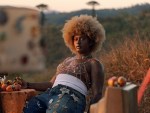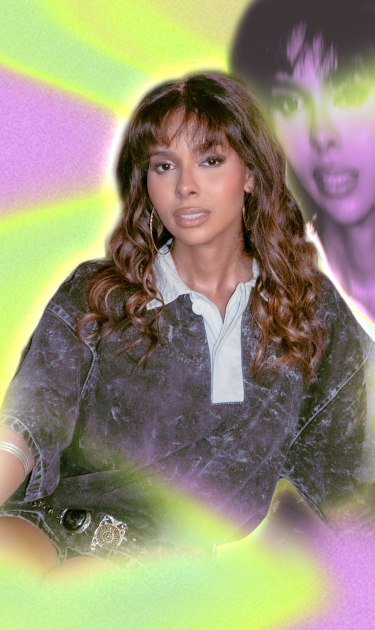Only a few months into a new chapter of her life, marked by physical transformation and artistic rebirth, the Brazilian trans singer Ella Viana is redefining her past while stepping into a future shaped by freedom and truth. Once a gospel prodigy championed by the country’s most prominent evangelical leaders, Ella has traded hymns for R&B and spiritual dogma for a faith on her own terms. Her latest single, “Amor à Luz do Dia” (“Love in the Daylight”), is a love letter to this transformation, a celebration of living openly and without fear.
Ella’s early career was steeped in evangelical gospel music. Her 2014 album Geração de Jesus (“Jesus’ Generation”) earned her a Latin Grammy nomination in the Best Christian Album (Portuguese Language) category and positioned her as a rising star within Brazil’s neo-Pentecostal scene. Yet, even amid thousands of admiring spectators, Ella struggled to see herself clearly. “I didn’t have examples of trans people. I was so involved in the church that I didn’t even know they existed. As a child, I would mix up being transgender with being a drag queen,” she recalls.
Even though she will turn 28 only in October, she feels like she’s already lived two lives in less than three decades. Born into a devout evangelical family in northern Brazil, the singer rose to fame at age four after performing on a nationwide children’s talent TV Show. By age 14, Silas Malafaia, one of Brazil’s most influential neo-Pentecostal priests, became her manager, playing a pivotal role in launching her gospel career. Malafaia is also a congressman known for his strong anti-LGBTQ+ views.
Her gender affirmation journey wouldn’t begin until the pandemic, first identifying as non-binary before finding language and community around being a trans woman. “Discovering that trans people really existed was a turning point,” she explains. “The leap in my life came when I asked myself how I imagined growing old. And I couldn’t see it — not as I was. That’s when I knew I had to change my story.”

Coming out as a trans woman in Brazil, however, carries far more weight than just personal freedom. Although the South American country boasts a vibrant LGBTQ+ culture and queer artistic expression often takes on bold political dimensions, Brazil also has one of the highest rates of violence against trans people in the world, per the Brazilian Association of Transvestites and Transsexuals (Antra). The growing political and cultural dominance of far conservative evangelical churches amplifies the threat, which now represents 26 percent of the population, according to the latest census, and often preaches a fundamentalist rejection of LGBTQ+ identities.
Ella’s transition took place amid that ongoing tension. Originally celebrated as a symbol of religious promise, her public shift led to backlash from the community that once embraced her. “It was a massive shock for them. I’ve received horrible messages, even death threats. But I had to go through with it as soon as possible. It was an urge I felt within myself,” she recalls.
The backlash and disappointment also resonated in the way she perceived her faith. Raised in a church that left no space for gender variance, Ella’s spirituality evolved gradually alongside her identity as she took her time to explore other beliefs. She’s now guarded when it comes to religion, confessing she’s afraid to share too much about her spiritual life. However, she admits to practicing a mix of religions, mostly those of African origin.

“Discovering that trans people really existed was a turning point. The leap in my life came when I asked myself how I imagined growing old. And I couldn’t see it — not as I was. That’s when I knew I had to change my story.”
While Ella has moved away from Christian music, gospel still lingers in her sound, rooted in the church choirs where many iconic R&B female singers first found their voices, just like her. Today, she is more aligned with R&B and pop, drawing inspiration from artists she has long admired, such as Beyoncé, H.E.R., and Kehlani. The themes of her music have shifted to reflect her lived experiences, focusing on heartbreak, self-discovery, self-love, freedom, and new relationships. Her latest song “Amor à Luz do Dia” (“Love in the Daylight”) marks the start of a larger project: a series of singles that explore love, identity, and the complexity of starting over as a trans artist in a conservative industry.
In this rhythm, Ella has found a fresh way to embrace her evolving identity by singing about love and sensuality but deliberately avoiding stereotypes and clichés. Where once she sang for an audience and for God, now her music is a dialogue with her inner self, a personal expression of her journey toward authenticity.
But rebuilding her music career hasn’t been easy. Despite her early fame, Ella now finds herself outside the mainstream spotlight. “We have Liniker, who’s gained widespread recognition,” she explains, “but she’s not the only one. How many other trans artists are left behind because they don’t get the same opportunities?” Bypassing conventional structures in the big-label music industry, Ella takes on multiple roles. In addition to composing, she works as her own producer, music video director, and social media manager. Her social media strategy has included using the adult subscription platform, Privacy, where she released the music video for her new single.

Aware that the path to recognition is difficult, especially for LGBTQ+ artists, Ella realizes it’s hard to chase numbers and not get frustrated initially. “I usually advise my trans artists friends in the scene: You can’t give up now. We’re doing something bigger, something that the new generation of trans singers will be proud of.”
She wants to keep working on new R&B music, with plans to release more singles in the coming months. The Brazilian singer says these will be stories about her current self, where she’ll sing about love, fear, joy, heartbreaks, attachments, and self-discovery. As she embraces what she calls the best chapter of her life, Ella reflects on her Christian upbringing without resentment. She sees that past, despite its challenges, as a necessary part of her journey – one that shaped her voice and led her to the freedom she now expresses through music.
